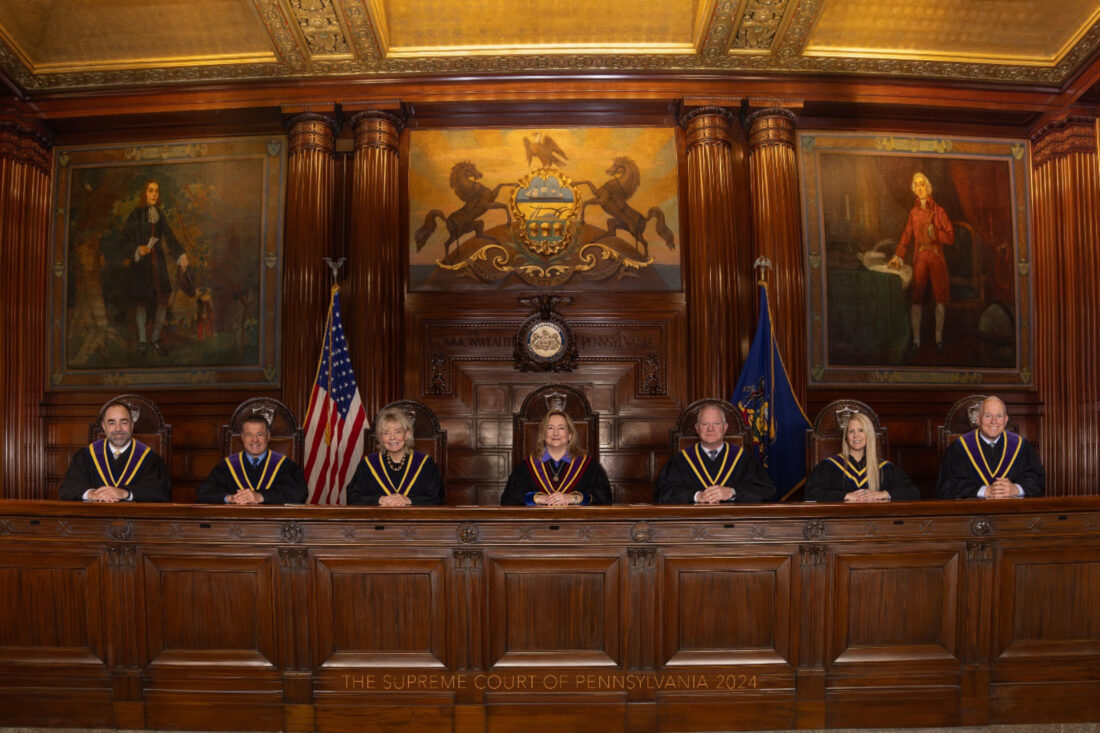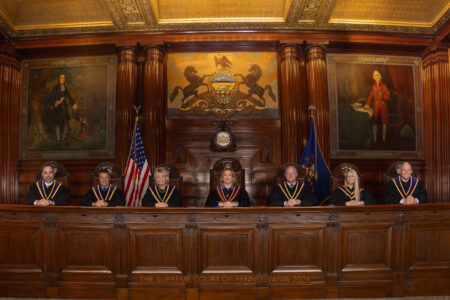Facebook posts still subject to PA Right-to-Know standards for public officials

Jen Barker Worley/Administrative Office of Pennsylvania Courts, via Penn Capital-Star The Pennsylvania Supreme Court is pictured in July 2024.
Judges may consider many factors to determine if a public official’s social media post is a public record under the Pennsylvania Right to Know Law, but what ultimately matters is whether it involves public business, the state Supreme Court said.
The high court made the ruling last Tuesday in an appeal by a Crawford County man who sought homophobic Facebook posts by two Penncrest School Board members critical of a display of LGBTQ+ literature outside a high school library.
The justices voted to send the case back to Crawford County Court for further review, upholding a 2023 decision in Commonwealth Court.
But the 4-3 majority rejected a “new test” proposed by the Commonwealth Court to determine whether social media posts are public records.
The Commonwealth Court instructed the county court to examine whether the social media accounts were public or private, whether the posts “prove, support, or evidence a transaction or activity of an agency,” and whether the posts constitute “actions of public officials in their official capacity.”
“Along these lines, we agree with the Commonwealth Court that in this case, the trial court was required, but failed, to consider a host of different factors when assessing whether the Facebook posts documented a transaction or activity “of an agency,” Justice Sallie Updyke Mundy wrote for the Supreme Court majority.
But it stressed a government record is narrowly defined as information that documents a transaction or activity of an agency and is created in connection with such business.
“Today, we reaffirm that this two-part inquiry is the only test to be utilized when determining whether disclosure of information, regardless of its form, is required under the statute,” Updyke Mundy wrote.
Melissa Melewsky, media law counsel for the Pennsylvania NewsMedia Association, said the Supreme Court’s decision preserves the status quo as far as the presumption that government records are public and the definition of a public record applying to social media posts. But it provides little clarity about what will happen in the case of the Penncrest School Board members.
“It’s really hard to have a brightline test where there are no brightline facts,” Melewsky said. “But it’s important to understand that the agencies and the courts that are interpreting challenges start from the standpoint that the presumption of access applies until there’s a very good reason there shouldn’t be.”
Penncrest School District drew attention in 2023 when it passed controversial policies on library materials that amounted to a ban on LGBTQ+ books and banned transgender girls from competing on girls’ sports teams.
According to the Commonwealth Court’s opinion, in May 2021 a parent in the school district posted a photo of a Pride Month book display with the comment, “Hey Maplewood/PENNCREST parents … just a little pic of what is on display at Maplewood High School Library … I realize this makes me a hater, but I am totally ok with that label.”
School board member David Valesky and Board President Luigi DeFrancesco reposted the photo on their Facebook pages. Valesky added the comment, “This is on display at Maplewood High School. Besides the point of being totally evil, this is not what we need to be teaching kids. They aren’t at school to be brainwashed into thinking homosexuality is okay. Its [sic] actually being promoted to the point where it’s even ‘cool.'”
Thomas Cagle made a Right to Know request for the board members’ posts that was denied by the school district. But the Office of Open Records and a Crawford County judge ruled in Cagle’s favor, directing the school district to comply with his request for posts and comments “related to homosexuality and Penncrest School District, its officials, employees, or students, or its curriculum, physical [resources], or electronic resources.”
Noting that no Pennsylvania court has directly tackled the question of whether public officials’ personal social media posts can be considered public records, a Commonwealth Court panel reversed the decisions.
Cagle sought an appeal in the Supreme Court, which was granted, and the Pennsylvania NewsMedia Association, the Reporters Committee for Freedom of the Press, the Pennsylvania School Boards Association and the American Civil Liberties Union of Pennsylvania filed “friend of the court” briefs.
Cagle argued the Commonwealth Court’s proposed test was convoluted and improperly treated social media differently than other information subject to the Right to Know Law. He also argued the lower court’s imposition of a requirement that posts be made in an “official capacity” is not supported by the text of the law and created incentives for officials to evade the law by using private accounts to conduct public business.
The school district argued that what the board members said in the posts was not as important as “where it was said,” comparing the Facebook posts to discussing board policy with friends at a back yard barbecue.
——
Pennsylvania Capital-Star is part of States Newsroom, a network of news bureaus supported by grants and a coalition of donors as a 501c(3) public charity. Pennsylvania Capital-Star maintains editorial independence. Contact Editor Tim Lambert for questions: info@penncapital-star.com. Follow Pennsylvania Capital-Star on Facebook and Twitter.




